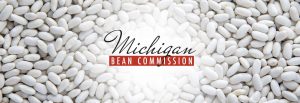For most of us, healthy eating has taken on an expanded meaning. We are looking for foods that provide benefits for both personal health and that of the planet. This is one reason why consuming more plant-based foods has become a popular trend. Research shows that consuming more plants, like Michigan Beans, can benefit the environment – they are good for people and the planet! Here are some of the interesting ways beans act as a healthy and sustainable food option:
- Michigan Beans, and all pulses, are natural soil enrichers. They have the ability to obtain nitrogen directly from the air and convert it into nutrients. This ability to fix nitrogen in the soil means that growers need to add little or no nitrogen fertilizer to grow a bean crop. Since greenhouse gas emissions from agriculture, in part, come from nitrogen fertilizers, pulse crops have a lower carbon footprint than most foods. (Food and Agriculture Organization of the United Nations)
- Growing beans makes the soil fertile which is great for other crops and helps to create a more diverse landscape for animals and insects. This high soil biodiversity helps to improve the ability of ecosystems to control diseases.
- Beans are also drought-tolerant and resistant to harsh weather. They adapt to varying climates and use less water than some other crops.
- Michigan Bean growers follow strict growing practices by engaging with MAEAP (Michigan Agriculture Environmental Assurance Program). The program guidelines and inspections, ensure growers are and will continue to be agricultural stewards and protect the environment. The Farmstead system looks at activities performed on the entire farm with a focus on protecting surface and groundwater. The Cropping system focuses on field-based activities such as water use, soil conservation, and nutrient management.
- Michigan Beans are a vital source of plant-based proteins and can be consumed as part of a healthy diet to prevent and help manage many chronic diseases.
- The high nutrient content of Michigan Beans also makes them ideal for vegetarians and vegans to ensure adequate intakes of protein, fiber, minerals and vitamins.
- Michigan Dried Edible Beans are incredibly versatile and can be stored for long periods of time without losing their nutritional value. Therefore, food waste from bean spoilage is minimal.
- Many Michigan Beans are processed into canned beans that are placed in 100% recyclable cans. Using products with recyclable packaging, and then recycling them, can play a significant role in reducing the amount of waste that finds its way into landfills and bodies of water.
Stocking your kitchen with Michigan Beans is a simple and affordable way to go greener. Here are some delicious, plant-based, recipes to add to your spring meal plan:





